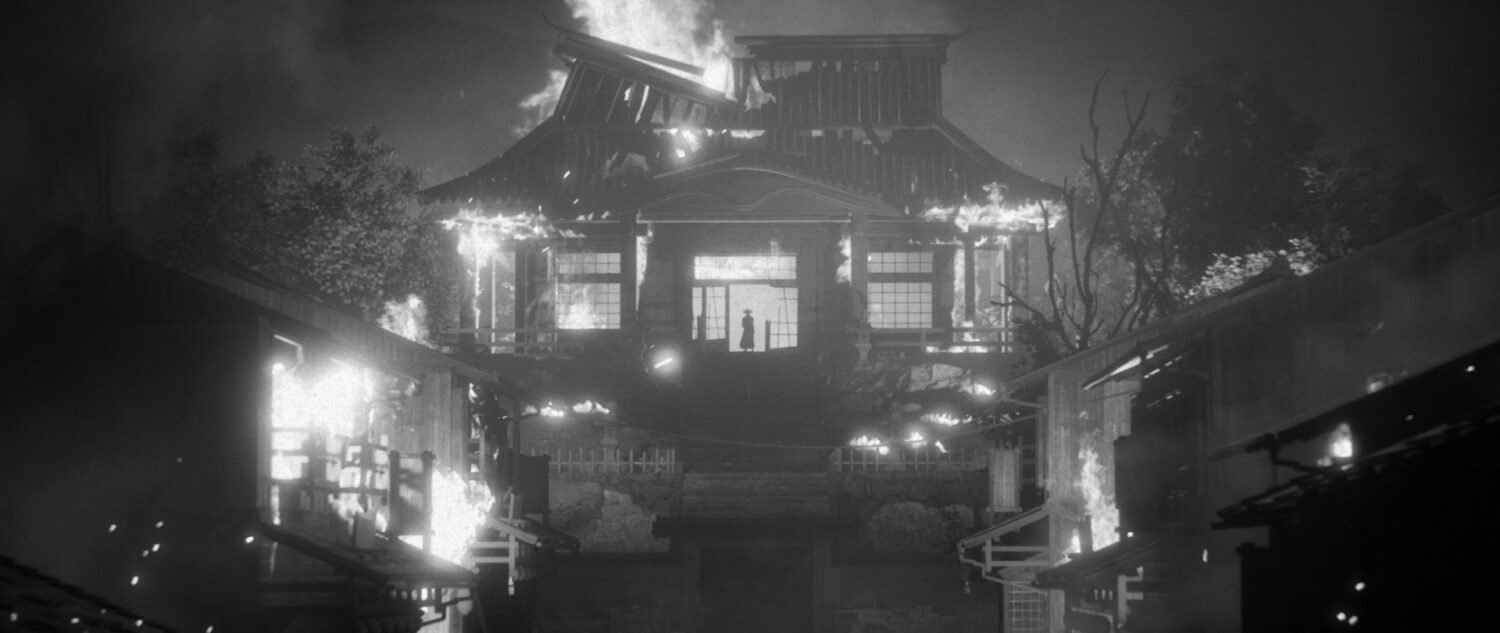Trek to Yomi is entirely greyscale. Ominous music plays over a gorgeously designed village shrouded in mist. The written options are accompanied by Japanese translations.
The game opens in a dojo where you, a young boy, are training with your master. This makes for a fun structure for the tutorial. Still, you are plunged very quickly into the action as your master is called away to deal with bandits and you hasten after him.
You practice the skills you have just learned by fighting the invading bandits. Here, it is clear what makes Trek to Yomi stand apart from many other action games. Instead of scrolling through a set two-dimensional map, the scene shifts with every new stage you reach. Camera angles shift and you see the full picture of every scene you enter. It looks like you’re watching a movie.

The focus isn’t always on the action. Instead, you fight around the wider scene, which pulls no punches in its depiction of the violence. The bodies of villagers lay strewn in your path. Survivors weep beside their dead loved ones and the burning remains of their homes. As you fight the bandits, both your sword and theirs interact with the world around you, not only smashing the occasional pot but knocking over fences and smashing planks off bridges.
It is a brutal reminder of your role in the carnage. You are forced to confront the enormous human cost of the game. While there may be vengeance and duty, there is no joy in the killing.
A bandit informs you that your destiny lies in Yomi. It’s an ominous warning about what to expect from the game, and if you have any hope at all of making it to the end alive.

The showdown with the bandits’ leader results in the loss of your master, but finally the aggressor leaves – with a nasty gash across his face thanks to your sword. You vow to protect your village in your master’s stead.
Trek to Yomi then flashes forward many years to your adulthood, when your home is threatened once again. You travel beyond the perimeter of your village, through other ravaged places. Even when you face the bandit you wounded as a child, your journey is far from over. You continue into a mysterious world where you are plagued by the ghosts of those you have slain, and those you failed to protect. You are faced with the question of what is truly important to you – revenge, love, or your duty.
The story is wonderfully told. The cutscenes are artfully designed and flow beautifully into and out of the gameplay. All the dialogue is recorded in Japanese, with subtitles reinforcing the cinematic atmosphere.

There are three difficulty levels for the action. It’s definitely worth playing on the easiest setting once so you can focus on the narrative. The action is fairly straightforward swordplay, with a variety of blocking and attacking combos you collect. It also features a tired state, which means you get worn down with each attack you block. This adds a layer of strategy as you have to consider your recovery time with each move your opponent takes.
You gain additional skills or stamina at regular intervals. They usually happen after a key fight, but otherwise aren’t tied to any particular experience development. There are plenty of shrines dotted throughout where you can save your progress, where you’ll respawn if you are defeated or pause for later.
There are also puzzle elements, which are infrequent but do break up the game so it’s not all hacking and slashing. Even the enemies you fight are well balanced between those who leap right into battle and those who take a moment for some profound dialogue, with a variety of different fighting styles.

Trek to Yomi blends a lot of fun gameplay with a truly stunning approach to design and a tragically haunting story. Combined, this makes for an addictive game that lingers with you long after you’ve completed it.
Review: Trek to Yomi (Nintendo Switch)
Very good
An intensely cinematic game, Trek to Yomi enhances the action-platformer genre with a rich story and beautiful design that leaves a lasting impression.


